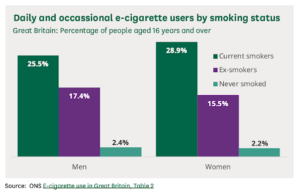Fi bidla reċenti u notevoli min-narrattiva tipika negattiva tal-midja dwar il-vaping u t-tnaqqis tal-ħsara fil-Ġermanja, Der Spiegel ippubblikat storja li tispikka. L-artiklu ddettalja l-vjaġġ ta’ ġurnalist biex jieqaf ipejjep permezz tal-vaping, u ppreżenta perspettiva preċiża u relatabbli dwar ir-riskji relattivi tal-vaping meta mqabbel mat-tipjip. Dan l-artiklu, disponibbli hawn, hija ġawhra rari f'pajsaġġ li spiss ikun imċajpar mix-xettiċiżmu u d-diżinformazzjoni.
Madankollu, ir-rispons għal dan l-artiklu, partikolarment minn figuri politiċi prominenti, ma kienx daqshekk inkoraġġanti. Renate Künast, politikant ewlieni mill-Partit Ekoloġiku tal-Ġermanja u eks Ministru għall-Protezzjoni tal-Konsumatur, ikkritikat l-artiklu, u implika li kien aktar biċċa promozzjonali milli storja ġenwina dwar il-waqfien mit-tipjip. Ir-reazzjoni tagħha tirrifletti kwistjoni usa' fil-politika tas-saħħa Ġermaniża – riluttanza biex jiġu rikonoxxuti l-benefiċċji potenzjali tal-vaping bħala għodda biex wieħed jieqaf ipejjep.
Din il-pożizzjoni qed tmur dejjem aktar kontra l-ammont dejjem jikber ta’ evidenza xjentifika li tappoġġja l-vaping bħala metodu effettiv biex wieħed jieqaf mit-tipjip. Pereżempju, il-ġimgħa li għaddiet, il- Cochrane Ir-reviżjoni affermat mill-ġdid b'ċertezza kbira li l-vapes tan-nikotina jgħinu lil aktar nies jieqfu jpejpu milli t-Terapiji tradizzjonali ta' Sostituzzjoni tan-Nikotina (NRTs). Minkejja dan, ix-xettiċiżmu u ċ-ċaħda diretta jippersistu fix-xenarju politiku Ġermaniż.
Barra minn hekk, l-Uffiċċju tal-Istatistika Nazzjonali tar-Renju Unit effettivament ċaħad it-teorija tal-gateway, billi wera li kważi l-vapers kollha huma jew jpejpu bħalissa jew kienu jpejpu. Din id-dejta tisfida n-narrattiva li l-vaping huwa triq lejn it-tipjip, u minflok tenfasizza r-rwol tiegħu fl-għajnuna lill-persuni li jpejpu jieqfu mit-tipjip.

Ir-riluttanza tal-politika tas-saħħa Ġermaniża li tħaddan il-vaping bħala għodda għat-tnaqqis tal-ħsara qed issir dejjem aktar problematika, speċjalment meta mqabbla mal-progress li sar f'pajjiżi oħra. L-Iżvezja, pereżempju, tinsab fuq il-ponta li ssir ħielsa mit-tipjip, l-aktar grazzi għall-approċċ progressiv tagħha għat-tnaqqis tal-ħsara. B'kuntrast, il-Ġermanja tkompli titħabat ma' aktar minn 100,000 mewta relatata mat-tipjip kull sena.
Wasal iż-żmien għal bidla fil-paradigma fil-politika tas-saħħa Ġermaniża. Billi tħares lejn mudelli ta’ suċċess bħal dak tal-Iżvezja, il-Ġermanja tista’ tadotta approċċ aktar effettiv u b’kompassjoni għall-waqfien mit-tipjip. L-adozzjoni ta’ strateġiji għat-tnaqqis tal-ħsara, inkluż il-vaping, tista’ ssalva għadd kbir ta’ ħajjiet u tnaqqas b’mod sinifikanti l-piż tas-saħħa pubblika tat-tipjip.
L-istorja f’Der Spiegel hija aktar minn sempliċi suċċess ta’ individwu; hija sejħa għall-azzjoni għal dawk li jfasslu l-politika biex jerġgħu jikkunsidraw il-pożizzjoni tagħhom dwar il-vaping u t-tnaqqis tal-ħsara. Hekk kif l-evidenza tiżdied u nazzjonijiet oħra jagħmlu passi 'l quddiem fit-tnaqqis tar-rati tat-tipjip, il-Ġermanja m’għandhiex tibqa’ lura fl-adozzjoni ta’ politiki li jipprijoritizzaw is-saħħa pubblika u jħaddnu strateġiji ppruvati għat-tnaqqis tal-ħsara.






Tweġiba Waħda